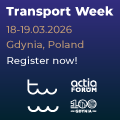Debate EU's ship eco rules, but don't reject them: UK transport committee
2012 03 13
- Details
THE British government must negotiate to ensure the EU directive on ship sulphur emissions go no further than the revised UN International Maritime Organisation's MARPOL Annex VI agreed in 2008, says the chairwoman of the parliamentary transport committee.
But Transport Committee chairwoman and Liverpool Labour MP, Louise Ellman, said the committee was against Transport Minister Norman Baker's view that the EU directive should be rejected.
"We do not agree with the minister's assertion that the government will not negotiate with the commission on its proposals. The government will have to forge alliances with other member states. We recommend that UK negotiators focus on removing the tighter emissions limits for passenger ships outside specified Emissions Control Areas and ensure that the directive replicates Annex VI safeguards regarding the non-availability of low-sulphur fuel," she said.
"We believe that it's not appropriate for the [European] Commission to go further than these globally-agreed limits by imposing tighter regulations on shipping operators. We therefore endorse the UK Government's efforts to resist any additional requirements," she said.
"These regulations were agreed on a worldwide basis through the International Maritime Organisation," said Ms Ellman.
The committee, she said, recognises that the benefits of the revised MARPOL Annex VI exceed the costs of compliance, acknowledges that costs will fall most directly on ship operators and accepts that the abatement technology required for passenger shipping may not yet be ready for widespread commercial use.
But MPs also reminded the shipping sector that tighter emissions limits have been under discussion for many years. "Operators could have been more proactive about developing effective pollution abatement technology and must shoulder the cost of ensuring that their activities comply with relevant environmental legislation," she said.
"Clearly the government must work with industry to identify available abatement technologies and help overcome barriers to the development of this equipment. But when tough emission standards were first imposed on cars, suitable technology emerged far more rapidly than much of the motor industry forecast and cost far less than predicted," Ms Ellman said.
Source Shipping Gazette - Daily Shipping News
The magazine SEA has been published since 1935
International business magazine JŪRA MOPE SEA has been published since 1999
The first magazine in Eurasia in the four languages: English, Chinese, Russian and Lithuanian
|
|





.jpg)





